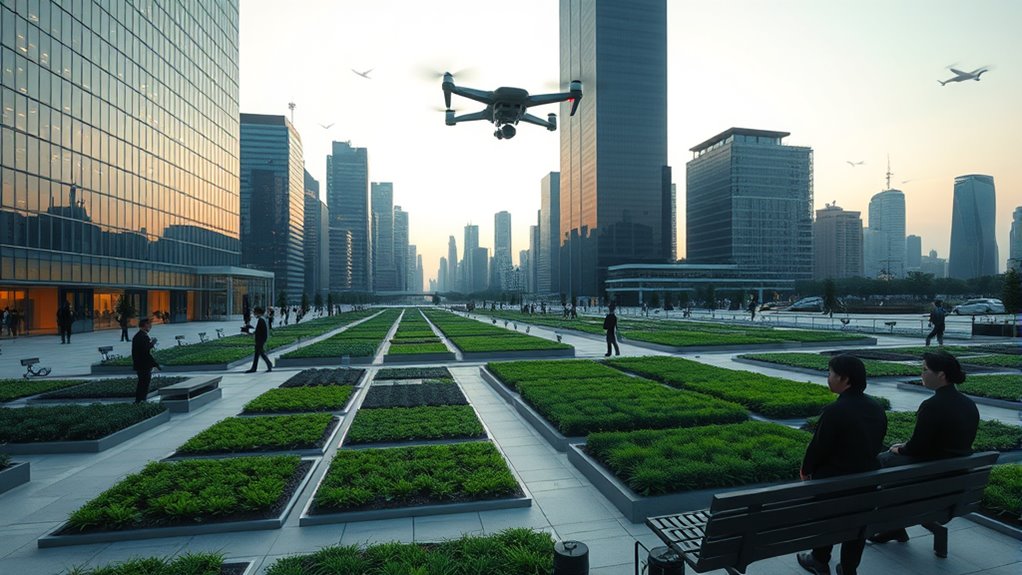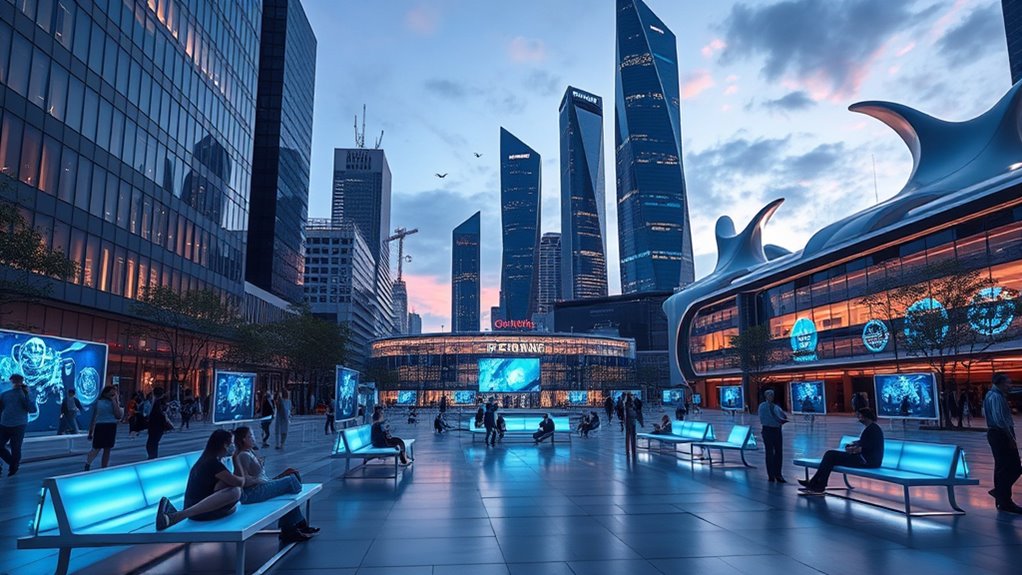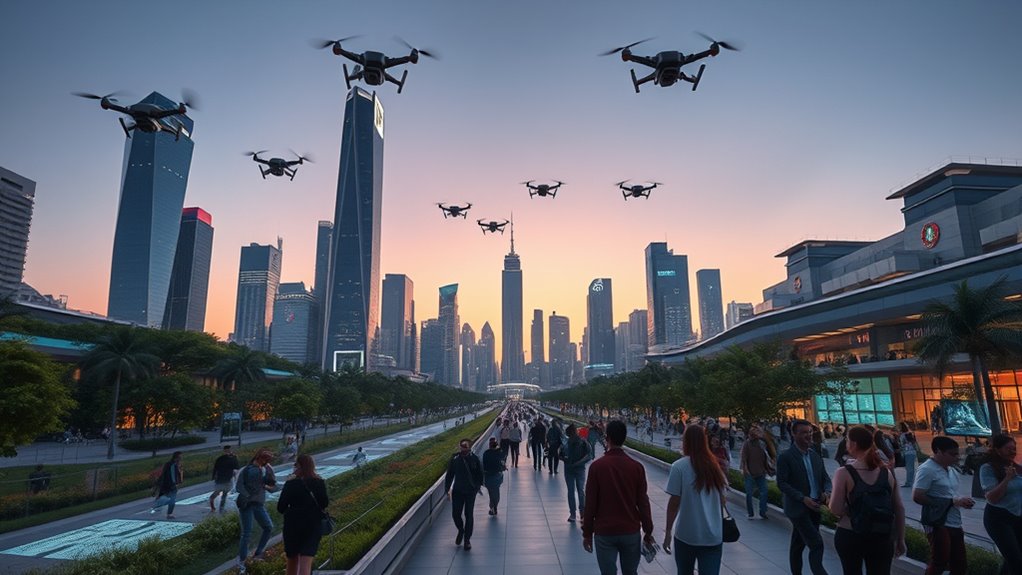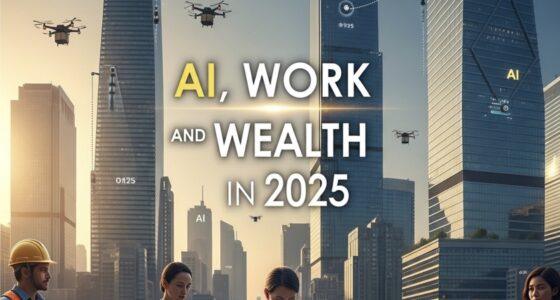A post-work society could become a utopia where automation and AI provide endless abundance, freeing you to focus on leisure, creativity, and personal growth. But it also risks becoming a dystopia if inequality, social division, or environmental harm grow unchecked. Society needs careful policies and ethical choices to guarantee this new era benefits everyone. Curious about how these changes might reshape your world? Keep exploring to discover what’s possible.
Key Takeaways
- Technological advances could create abundance and leisure, leading to a utopian society focused on human flourishing beyond work.
- Widespread job displacement and inequality pose dystopian risks if social safety nets and equitable policies are not implemented.
- Society may shift from productivity to personal growth, emphasizing creativity, autonomy, and social contribution in a post-work era.
- Unequal access to technology and environmental impacts could deepen divisions, challenging societal stability and sustainability.
- Organizational and policy adaptations are crucial to ensure a just transition, avoiding dystopia and fostering a society centered on well-being.
Understanding the Foundations of a Post-Work Future

To understand the foundations of a post-work future, it is essential to examine how technological advances, especially automation and AI, are transforming the nature of work. These innovations automate routine and formal tasks, reducing the need for human labor in many industries. As technology improves, more production and service activities can operate efficiently with minimal human oversight. This shift challenges the traditional link between work and income, making it possible for productivity to decouple from human employment. The remaining necessary work will likely be supported by technology, emphasizing efficiency over employment. These changes lay the groundwork for a society where income may no longer depend on traditional jobs, prompting a fundamental reevaluation of economic and social structures. Automation’s increasing capabilities also suggest that many tasks once thought to require human skill can be performed by machines, further accelerating this transition. Recognizing the potential for economic restructuring is vital for understanding how society might adapt to these profound shifts. Additionally, advances in energy-efficient systems are crucial for supporting a sustainable post-work society, emphasizing the importance of integrating technology into daily life. Moreover, the development of renewable energy sources plays a key role in ensuring environmental sustainability as society transitions away from traditional employment models. The integration of advanced energy systems will be essential for creating resilient and adaptable infrastructure in this new paradigm.
Visions of Utopia: Prosperity and Freedom Without Jobs

Imagine a future where technology provides endless abundance, giving everyone access to goods and services without the need for traditional work. With more leisure time, you’d have the freedom to pursue passions, care for loved ones, or contribute creatively to society. This utopia aims for prosperity and autonomy, allowing human flourishing beyond economic necessity. However, such a society would require fundamental changes to our political economy and social institutions to address issues like resource distribution and social utility embodying minimal labour value despite their perceived scarcity.
Abundance and Leisure
Could a future where automation grants us abundant resources and ample leisure become a reality? It’s possible as technology could displace up to 99% of current jobs, making machines handle most tasks. This shift could create material abundance by slashing production costs and boosting efficiency. With goods and services available constantly thanks to AI and robotics, the economy would prioritize distribution over scarcity. Furthermore, the trajectory of exponential technological advances suggests that such a society is increasingly plausible rather than merely speculative. Consider these points: 1. Increased automation frees up significant leisure time, allowing personal growth and creativity. 2. Many people, dissatisfied with work-life balance, would benefit from reduced work demands and lower burnout. 3. Expanded leisure opportunities could grow sectors like arts, sports, and tourism, changing how you engage with society. This new abundance challenges traditional work-based income, prompting societal and policy changes. Additionally, advancements in AI-powered smart city technologies could further enhance resource management and urban living, supporting such a society. Moreover, the integration of automated production systems could optimize resource distribution and minimize waste, making abundance sustainable in the long term. Recognizing the potential of AI bifurcation can help us better prepare for the societal shifts ahead, especially as personal development tools evolve to assist individuals in adapting to rapid change. Furthermore, natural element incorporation into urban design can promote well-being and environmental harmony in such societies.
Autonomous Human Flourishing
Autonomous human flourishing envisions a society where individuals thrive through their ability to make meaningful choices, supported by a resilient community that offers security, knowledge, and resources. Central to this vision are autonomy, justice, and mutual respect, ensuring dignity and emotional well-being. You’re encouraged to pursue self-respect and uphold ethical values, fostering a society where personal growth and collective harmony coexist. Virtual utopias may enhance well-being, blending real and digital worlds while preserving human agency. A successful societal shift involves reducing work hours, implementing basic income, and providing lifelong education. Yet, challenges like technological impacts and mental health risks require careful navigation. Here’s a quick overview:
| Principle | Focus | Impact |
|---|---|---|
| Autonomy | Making meaningful choices | Personal fulfillment |
| Community Support | Security, knowledge, resources | Social cohesion |
| Ethical Values | Justice, respect, dignity | Societal harmony |
The integration of advanced technologies can facilitate holistic well-being by supporting diverse human needs, but it also necessitates ethical safeguards to prevent misuse. Additionally, fostering technological literacy is essential for individuals to navigate and benefit from these innovations responsibly. Moreover, the rapid development of breakthrough technologies in 2024 can significantly enhance quality of life when integrated thoughtfully. Embracing a comprehensive understanding of human-centered design will be crucial for creating inclusive and accessible solutions that serve everyone’s needs.
Concerns and Challenges: Risks of a Dystopian Shift

As societies shift toward a post-work era, numerous concerns and challenges threaten to turn this vision into a dystopian reality. You might face increased unemployment, widening social inequalities, and dependence on technology.
- Job Displacement and Inequality: Automation could eliminate many jobs, deepening economic gaps and social tensions, especially if resources aren’t shared fairly. The disruption of traditional employment relations may also undermine existing social safety nets and collective bargaining rights, exacerbating inequality. Moreover, unequal access to advanced technologies could further entrench social divisions and digital divides.
- Environmental and Psychological Strains: Maintaining economic growth may harm the environment, while constant technological change could cause stress, dissatisfaction, and social fragmentation. The pursuit of continuous productivity often overlooks the social and ecological costs involved. Additionally, the loss of routine work might impact individuals’ sense of purpose and mental well-being.
- Power Imbalances and Social Cohesion: Relying heavily on technology and government support risks creating unequal access, social isolation, and weakened community bonds. Managing these risks is vital to avoid a dystopian future. The concentration of power in tech corporations or government agencies may further marginalize vulnerable populations and undermine social cohesion. Ensuring equitable distribution of technological benefits is essential to maintain societal stability.
Rethinking Value: From Labor to Leisure and Creativity

As society shifts away from traditional work, you’ll need to reconsider what truly holds value—beyond just labor. Emphasizing leisure and creativity, you can find purpose in activities that foster personal growth and innovation. This new perspective invites you to redefine fulfillment and see work as one of many paths to meaning. Recognizing the importance of human well-being over exchange values underscores the potential for a society where human well-being is prioritized over mere productivity.
Redefining Work’s Purpose
With automation and technological advancements transforming the labor landscape, the purpose of work is shifting from mere productivity to personal fulfillment and societal well-being. As machines take over routine tasks, your time can be dedicated to leisure, creativity, and innovation. This shift encourages you to develop new skills and pursue passions that add societal value beyond earning a paycheck. Consider these trends:
- Increased leisure time may boost your overall well-being and life satisfaction.
- Greater emphasis on creativity *unlocks* your potential for innovation and problem-solving.
- Work’s role evolves from livelihood to social contribution and personal growth.
- The creation of 170 million new jobs, driven by green transition and digital access, offers opportunities for personal and societal development. This growth highlights how the nature of work is expanding into new sectors and roles beyond traditional employment, emphasizing the importance of adaptability and lifelong learning. Additionally, embracing a post-work society can foster greater community engagement and personal development. As research supports, this shift can also enhance overall personal fulfillment and societal resilience.
Celebrating Creative Engagement
Have you noticed how employee engagement is hitting new highs, signaling a shift in workplace values? Today, more workers find fulfillment through creative expression and autonomy. With 36% of U.S. employees engaged at work—an all-time high—companies see a 17% productivity boost and a 21% rise in profitability. Globally, 23% are actively engaged, reflecting a broader trend. Emphasizing work-life balance, flexibility, and creative rewards enhances satisfaction and reduces burnout. Allowing employees to explore their passions and express creativity not only improves well-being but also strengthens organizational loyalty. As the value of leisure and creative pursuits gains recognition, workplaces are transforming into environments where innovation thrives, and fulfillment extends beyond traditional labor. Current levels of engagement are often underestimated and overlooked by top leaders, despite their critical importance. Recognizing the role of cultural impact can further enhance understanding of how technological influences shape creative expression and community engagement. This shift signals a new era of meaningful engagement rooted in personal growth and societal well-being, as organizations increasingly recognize the importance of creative engagement in fostering a thriving workforce.
Organizational Changes in a Jobless Society

In a society increasingly shaped by automation and technological advancements, organizations are transforming their structures to adapt to a post-work reality. You’ll notice shifts like:
- Embracing part-time and voluntary work, which offers flexibility and social value.
- Promoting workplace democracy and self-governance, giving employees more decision-making power.
- Steering through blurred boundaries between work and personal life, leading to challenges in maintaining work-life balance.
These changes reflect a move toward a knowledge-based economy, with a focus on specialized skills, especially in IT. While telecommuting provides flexibility, it can also increase stress. Overall, organizations are evolving to prioritize social well-being and community engagement in this new landscape.
Technological Forces Driving the Transition

Advancements in automation and artificial intelligence are reshaping industries at a rapid pace. Robots and machines now handle assembly lines and service tasks, boosting productivity and precision while freeing humans for more complex roles. AI and machine learning systems learn, reason, and make decisions independently, streamlining routine processes across sectors. Machines can operate in harsh conditions and for extended periods without fatigue, making them more efficient than human labor. However, automation displaces many routine jobs, prompting a shift toward innovative, strategic roles. AI technologies like ChatGPT have increased efficiency and sparked debates about job security. Predictions suggest AI may soon match human intelligence in many areas, potentially transforming workforce dynamics and prompting society to rethink traditional employment and purpose.

As societies confront a rapidly changing work landscape, crafting effective policies and ethical frameworks becomes essential to guarantee a fair shift. You need to focus on balanced approaches to assure no one is left behind. Here are key strategies:
- Implement UBI and job guarantees to provide safety nets for displaced workers, decoupling income from traditional employment.
- Promote educational reskilling policies that prepare individuals for new opportunities, fostering lifelong learning.
- Enforce fair taxation of capital and automation to fund social programs and reduce inequality.
These policies must be underpinned by ethical principles that respect human dignity, guarantee equitable access, and prevent digital divides. By doing so, you create a society that values all roles and safeguards social cohesion amid rapid change.
Frequently Asked Questions
How Will Income Inequality Be Addressed in a Post-Work Society?
You might wonder how income inequality gets addressed when work isn’t central anymore. In a post-work society, policies like Universal Basic Income ensure everyone gets a minimum income, while progressive taxes on the wealthy help redistribute wealth. Enhanced social programs provide equal opportunities, and job redesign focuses on meaningful roles. Investing in education and retraining prepares you for new industries, helping create a fairer, more balanced society.
What Roles Will Education and Skill Development Play After Widespread Automation?
You’ll find that education and skill development become essential for staying relevant in an automated world. You’ll need to embrace lifelong learning, focusing on interdisciplinary skills like STEM, creativity, and emotional intelligence. Reskilling and upskilling will help you shift into new roles, especially those requiring human judgment and social skills. You’ll also see a shift toward personalized learning and policies that guarantee everyone has access, fostering adaptability and resilience in a changing job landscape.
Can Cultural Shifts Sustain Meaningful Social Identity Without Traditional Work?
You might wonder if cultural shifts can keep your social identity alive without traditional work. As society evolves, you’re encouraged to find meaning through community involvement, personal growth, and leisure activities. These new sources of identity can be just as fulfilling, providing connection and purpose beyond employment. Embracing non-traditional roles and engaging in social or creative pursuits helps you build a sense of belonging, even as work’s role changes.
How Might Global Differences Impact the Transition to a Post-Work World?
They say “variety is the spice of life,” and it’s true for the global change to a post-work society. Your experience will depend heavily on where you’re from, as economic, cultural, and policy differences shape opportunities and challenges. You’ll need adaptable skills and open-mindedness to navigate regional disparities, ensuring that the shift benefits everyone, not just a few, and promotes fairness across diverse societies.
What Safeguards Exist Against Technological Misuse or Societal Control?
You should know safeguards against technological misuse include laws that ensure transparency, accountability, and rights protection. You’re protected by regulations requiring explainable AI, audit trails, and oversight bodies that monitor compliance. Public access to information and whistleblower protections encourage ethical practices. Continuous legal reforms adapt to new tech, while civic education and digital literacy empower you to recognize and challenge harmful or unjust technological applications.
Conclusion
As you consider the future, remember Pandora’s box—technology holds immense promise but also unforeseen risks. While a post-work society could mirror Atlantis’s lost paradise or a new dawn of freedom, it demands careful navigation. Embrace innovation with wisdom, balancing progress with ethics. Ultimately, your choices shape whether this shift leads to utopia, dystopia, or something entirely different—an uncharted domain where humanity’s true value is rediscovered beyond the toil.









